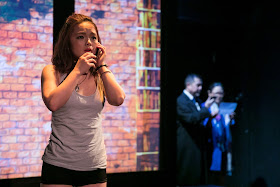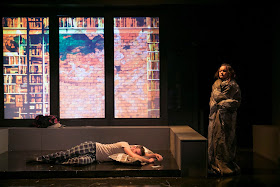“When Worlds Collide”

 It’s a pleasant surprise to find a New York theatre offering a play written in English by a bilingual, contemporary, female Chinese playwright, especially one as interesting as Zhu Yi’s A Deal. And even more of a surprise that it’s not being presented by one of the town’s leading Asian-American companies but by Urban Stages, a noteworthy Off-Broadway venue whose longtime artistic director, Frances Hill, is increasingly focused on new international work.
It’s a pleasant surprise to find a New York theatre offering a play written in English by a bilingual, contemporary, female Chinese playwright, especially one as interesting as Zhu Yi’s A Deal. And even more of a surprise that it’s not being presented by one of the town’s leading Asian-American companies but by Urban Stages, a noteworthy Off-Broadway venue whose longtime artistic director, Frances Hill, is increasingly focused on new international work.  |
| Seth Moore, Wei-Yi Lin. Photo: Ben Hider. |
Yi’s well-performed, prize-winning play (in both China and Taiwan), representing her Off-Broadway debut, covers a few too many bases within its episodic, roughly 90-minute format, preventing it from going very deeply into any of them, but it manages to be consistently entertaining and informative.
Like so many plays about immigrants striving to make it in America, it deals with issues of assimilation faced by foreigners seeking to blend into this country’s mainstream culture; it also confronts the clash between the values of old world parents and their new world offspring. In addition, it introduces issues of currency war, rapidly changing exchange rates, communism versus capitalism, corruption on high and low levels, classism, money smuggling, media exploitation, the 2015 surge in Chinese buyers of American homes, and so on.
 |
| Wei-Yi Lin, Lydia Gaston, Alan Ariano. Photo: Ben Hider. |
Most of this is offered on a lightly satirical platter, creating a tone more sitcom than serious dramatic exposé. My plus-one was a middle-aged Chinese theatre scholar whose father is a leading scene designer in Beijing. As we briefly chatted after the play, he commented that the playwright’s basic facts, especially the numbers mentioned in dialogue concerning currency changes, were accurate but he felt she might have gone further into some of her core economic issues. To do so, however, would have required a less diverse set of targets than the play now offers.
 |
| Alan Ariano, Pun Bandhu. Photo: Ben Hider. |
That thematic smorgasbord is made even more varied by having the heroine, Li Su (Wei-Yi Lin), called Susu, be a struggling, lightly-accented, Columbia-educated, Chinese-born actress trying to get cast in her first Off-Broadway play. This raises problems related to the obstacles faced by a novice Asian actress in getting stage work in New York. It also introduces a white playwright with whom Susu becomes involved so it can comment on the difficulties even a successful writer has in maintaining a theatre career. Even the potentially provocative idea of a white American writing a play about the Chinese is briefly questioned. Self- as well as other-directed deceptions figure in each of the play’s multiple thematic threads.
 |
| Lydia Gaston, Helen Coxe, Alan Ariano. Photo: Ben Hider. |
When we first meet Susu she’s auditioning for a role she’s desperate to land in a play about Chinese society by famous playwright, Josh Haley (Seth Moore). Susu’s the daughter of well-off, non-English-speaking parents, Mr. Li (Alan Ariano) a self-made Chinese millionaire, and Mrs. Li (Lydia Gaston), a former actress.
 |
| Lydia Gaston, Wei-Yi Lin, Alan Ariano. Photo: dBen Hider. |
Mr. Li is a proud communist (despite his wealth) obsessed with how he was able to rise from poverty and become so successful that he was able to give his daughter an expensive, Ivy League education. Despite being the child of such highly-placed parents, Susu gets the role only after making up a story about a tragic Chinese childhood mirroring that of the character she wants to play.
 |
| Helene Coxe, Seth Moore, Wei-Yi Lin. Photo: Ben Hider. |
Although the phrase isn’t used, this example of “fake news” hurtles Susu into the media spotlight where her political views are exaggerated at the expense of her homeland’s reputation. When she finally tries to fess up about her fibbing, though, she’s met with ironic indifference. Everybody does it, so what’s the big deal?
 |
| Wei-Yi Lin. Photo: Ben Hider. |
The many other plot elements include Mr. and Mrs. Li’s desire to buy a luxury apartment for Susu in Manhattan for $1 million from a dishonest American real estate saleswoman in Shanghai; their connecting with Peter (Pun Bandhu), Mrs. Li’s onetime lover, now a New York real estate broker, who still carries a torch for her, and helps the Lis look for an affordable apartment ($1 million being enough for a bathroom in the New York market); and an affair between Susu and Josh, who, earlier, asks her to do something that sounds as if it were ripped from recent headlines about sexual harassment.
 |
| Wei-Yi Lin, Helen Coxe. Photo: Ben Hider. |
Too many themes spoil the focus; for example, a tighter script might have done without such extraneous subplots as Peter and Mrs. Li’s youthful romance, when they played Romeo and Juliet opposite one another. The jealous rivalry this creates between Peter and Mr. Li is encapsulated in an extensive slow-mo slugfest reflecting their political and personal differences. It’s fun but it’s distracting.
 |
| Wei-Yi Lin, Alan Ariano, Lydia Gaston. Photo: Ben Hider. |
Director John Giampietro keeps the action, which occurs in multiple locales, flowing smoothly on Frank J. Oliva’s simple but flexible gray set of basic furniture and movable seating units. Ryan Belock’s projections of painting, photograph, and video images establish specific places in Shanghai and New York—including during several driving scenes—on three contiguous upstage screens.
 |
| Seth Moore, Wei-Yi Lin. Photo: Ben Hider. |
Audrey Nauman’s costumes are helpfully character-defining, especially when the same actors (the versatile Helen Coxe among them) play several roles, and John Salutz provides suitable lighting and sound design.
Wei-Yi Lin makes a fine impression as the daughter torn between her parents’ values and her goal of American success, and she’s capably backed by the supporting company, especially Ariano and Gaston as Mr. and Mrs. Li.
This is a comedy with perhaps too much to say, but it says it with enjoyable panache. If you can get over its title’s resemblance to a certain billionaire’s book, you might approve of the art in Zhu Yi’s A Deal.
OTHER VIEWPOINTS:
Urban Stages
259 W. 30th St., NYC
Through December 10
